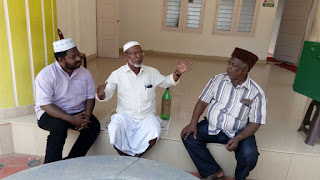 Hadhrat Munir Ahmad Azim Saheb (atba) of
Mauritius, the Divinely-raised renewer of spirituality in our times (Muhyi-ud-Din/Mujaddid), and the Holy Founder of the Jamaat Ul Sahih Al Islam, often goes on Da’wah journeys to distant places in various countries. The purpose of these spiritual voyages is to convey the essence of the Sublime message being vouchsafed to him from the Unseen through pious dreams, true visions and Divine revelations. Like all Divine servants who preceded him throughout Islamic history, Hadhrat Saheb’s mission- the Jamaat Ul Sahih Al Islam- strives to urge people to embrace a life in awe of the Exalted Almighty, the unique and singular God through finding the beauty of equity and virtuosity in all spheres of everyday life; performing good deeds in service of fellow beings, regardless of their station and status in society.
Hadhrat Munir Ahmad Azim Saheb (atba) of
Mauritius, the Divinely-raised renewer of spirituality in our times (Muhyi-ud-Din/Mujaddid), and the Holy Founder of the Jamaat Ul Sahih Al Islam, often goes on Da’wah journeys to distant places in various countries. The purpose of these spiritual voyages is to convey the essence of the Sublime message being vouchsafed to him from the Unseen through pious dreams, true visions and Divine revelations. Like all Divine servants who preceded him throughout Islamic history, Hadhrat Saheb’s mission- the Jamaat Ul Sahih Al Islam- strives to urge people to embrace a life in awe of the Exalted Almighty, the unique and singular God through finding the beauty of equity and virtuosity in all spheres of everyday life; performing good deeds in service of fellow beings, regardless of their station and status in society. Inspired by this personal example of their beloved Imam (atba), Hadhrat Saheb’s disciples in India also go on Da’wah journeys, whenever opportunities present themselves. In a recent such episode, Mukarram Amir R. Jamaluddin Saheb of the South Kerala Jamaat, accompanied by brothers Sulfikar Ali Saheb and Sadiq Ali Saheb of Kaliyikkavila, visited the border areas of Kerala-Tamil Nadu and went all the way to Kanya Kumari, the southernmost tip of the Indian peninsula. The present writer had the pleasure and privilege of accompanying this band of Divine servants on trip, Alhamdulillah. From the sights and sounds we encountered and through the conversations and interactions we have had with a number of people during the journey, it is humbling to realize that we became far more self-aware, Soumma Alhamdulillah.
And who is better in speech than he who
invites men to Allah
and does good works and says, ‘I am surely of those who submit?’ [41:34]
Call unto the way of thy Lord with wisdom
and goodly exhortation, and argue with them in a way that is best. Surely, thy
Lord knows best who has strayed from His way; and He knows those who are
rightly guided. [16:126]
And let there be among you a body of men who should invite to goodness, and enjoin equity and forbid evil. And it is they who shall prosper. [3:105]
And let there be among you a body of men who should invite to goodness, and enjoin equity and forbid evil. And it is they who shall prosper. [3:105]
It is such
profound teachings in the Qur’an that inspired early Muslims to preach their
sublime faith wherever they went. Indeed, Islam entered almost every corner of
the world through the last millennia and before through peaceful preaching. “Most of Islamic
world was never conquered at all, but became Muslim through the example of
saintly figures, preaching, or simple contact with pious Muslim merchants”, as
scholar Caner K. Dagli notes in one of his essays.
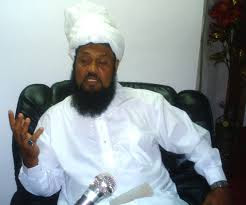 Today, out of a world
population of around 7.5 billion, close to 1.7 billion and counting, identify
themselves as Muslims. The dire state of affairs in the domain of Islam in this era calls for soul searching by Muslims of all denominations and sects. Just as there is a great need to introduce and explain Islam to the larger mass of non-Muslims in the world, there is also the glaring need for internal reforms and renewal within the Ummah. Islam has always prevailed through the mighty help of the Divine, despite the countless challenges and travails faced by the believing servants all through history. The mighty tasks and challenges of the Faith can only be shouldered by a blessed soul in communion with God Almighty and when people flock under him, seeking guidance and illumination on their individual and collective paths. The Divine Manifestation in this era offers the possibility of experiencing the shadow of Divine help and assistance for all servants of God who flock under the Elect of God and seek to further the cause of the Divine mission in this era, Alhamdulillah. In many ways, the brothers who participated in the modest Da’wah programme they undertook also understood that they are bearing witness to the presence of a Divine Elect in this era, calling people to the straight and correct path of God, Soumma Alhamdulillah.
Today, out of a world
population of around 7.5 billion, close to 1.7 billion and counting, identify
themselves as Muslims. The dire state of affairs in the domain of Islam in this era calls for soul searching by Muslims of all denominations and sects. Just as there is a great need to introduce and explain Islam to the larger mass of non-Muslims in the world, there is also the glaring need for internal reforms and renewal within the Ummah. Islam has always prevailed through the mighty help of the Divine, despite the countless challenges and travails faced by the believing servants all through history. The mighty tasks and challenges of the Faith can only be shouldered by a blessed soul in communion with God Almighty and when people flock under him, seeking guidance and illumination on their individual and collective paths. The Divine Manifestation in this era offers the possibility of experiencing the shadow of Divine help and assistance for all servants of God who flock under the Elect of God and seek to further the cause of the Divine mission in this era, Alhamdulillah. In many ways, the brothers who participated in the modest Da’wah programme they undertook also understood that they are bearing witness to the presence of a Divine Elect in this era, calling people to the straight and correct path of God, Soumma Alhamdulillah.
 Today, out of a world
population of around 7.5 billion, close to 1.7 billion and counting, identify
themselves as Muslims. The dire state of affairs in the domain of Islam in this era calls for soul searching by Muslims of all denominations and sects. Just as there is a great need to introduce and explain Islam to the larger mass of non-Muslims in the world, there is also the glaring need for internal reforms and renewal within the Ummah. Islam has always prevailed through the mighty help of the Divine, despite the countless challenges and travails faced by the believing servants all through history. The mighty tasks and challenges of the Faith can only be shouldered by a blessed soul in communion with God Almighty and when people flock under him, seeking guidance and illumination on their individual and collective paths. The Divine Manifestation in this era offers the possibility of experiencing the shadow of Divine help and assistance for all servants of God who flock under the Elect of God and seek to further the cause of the Divine mission in this era, Alhamdulillah. In many ways, the brothers who participated in the modest Da’wah programme they undertook also understood that they are bearing witness to the presence of a Divine Elect in this era, calling people to the straight and correct path of God, Soumma Alhamdulillah.
Today, out of a world
population of around 7.5 billion, close to 1.7 billion and counting, identify
themselves as Muslims. The dire state of affairs in the domain of Islam in this era calls for soul searching by Muslims of all denominations and sects. Just as there is a great need to introduce and explain Islam to the larger mass of non-Muslims in the world, there is also the glaring need for internal reforms and renewal within the Ummah. Islam has always prevailed through the mighty help of the Divine, despite the countless challenges and travails faced by the believing servants all through history. The mighty tasks and challenges of the Faith can only be shouldered by a blessed soul in communion with God Almighty and when people flock under him, seeking guidance and illumination on their individual and collective paths. The Divine Manifestation in this era offers the possibility of experiencing the shadow of Divine help and assistance for all servants of God who flock under the Elect of God and seek to further the cause of the Divine mission in this era, Alhamdulillah. In many ways, the brothers who participated in the modest Da’wah programme they undertook also understood that they are bearing witness to the presence of a Divine Elect in this era, calling people to the straight and correct path of God, Soumma Alhamdulillah.
India’s
deep-South is a fascinating geographic terrain, with a long coastline that
stretches well into the east and west of the Indian subcontinent. At Kanya Kumari, the East and West of India meet- the Arabian Sea in the
west and the Bay of Bengal in the east merge into the larger Indian Ocean at
the southernmost point of the mainland.
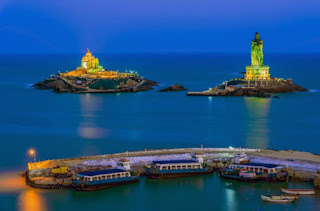 There is little doubt that the lineages of the present indeed go
back in time even beyond what we know through available written records. Thanks to the geographical proximity with the Seas, the land has witnessed the advent of the foreigners over the centuries and evolved through time a rich history of complex interactions and is, hence, a cultural melting pot of different religious and linguistic communities.
There is little doubt that the lineages of the present indeed go
back in time even beyond what we know through available written records. Thanks to the geographical proximity with the Seas, the land has witnessed the advent of the foreigners over the centuries and evolved through time a rich history of complex interactions and is, hence, a cultural melting pot of different religious and linguistic communities.
 For long, the Maharajas (Kings) of Travancore had their headquarters and palace in the Kanya Kumari region. For close to two centuries (1600-1791), the entire region
constituting what is today called Southern Kerala and Southern Tamil Nadu were
administered from the same place. In the ebb and flow of time, the area witnessed many political battles and wars of domination between foreign invaders and native Rajas, including the famous Battle of Kulachal (1741) when a Deutch army, seeking domination in the area, was defeated by Maharaja Marthanda Varma. With the advent of a new age and another group of people-the mighty British Empire on the shores of India, the later Travancore Maharajas found a decline in their fortunes and were reduced to the position of vassals and subordinate allies of a mighty colonial administration till the eventual attainment of national independence in 1947 when a new era dawned on the Indian horizon.
For long, the Maharajas (Kings) of Travancore had their headquarters and palace in the Kanya Kumari region. For close to two centuries (1600-1791), the entire region
constituting what is today called Southern Kerala and Southern Tamil Nadu were
administered from the same place. In the ebb and flow of time, the area witnessed many political battles and wars of domination between foreign invaders and native Rajas, including the famous Battle of Kulachal (1741) when a Deutch army, seeking domination in the area, was defeated by Maharaja Marthanda Varma. With the advent of a new age and another group of people-the mighty British Empire on the shores of India, the later Travancore Maharajas found a decline in their fortunes and were reduced to the position of vassals and subordinate allies of a mighty colonial administration till the eventual attainment of national independence in 1947 when a new era dawned on the Indian horizon.
Padmanabhapuram Palace
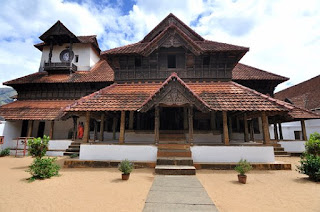 In the 1950's, when India officially reorganized many of its provinces on the basis of linguistic majority, Kanya Kumari area was made a part of the Tamil-speaking State of Tamil Nadu. Until then, the area was the centre of the Malayalam-speaking, erstwhile Travancore State that has broadly become Southern Kerala today. Though Kerala 'lost' the territory holding the Palace of the Travancore Maharajas, thanks to the reorganization of the entire region; under administrative arrangements with the State of Tamil Nadu, the Padmanabhapuram Palace is still preserved by the Cultural Heritage department of the Kerala Government.
In the 1950's, when India officially reorganized many of its provinces on the basis of linguistic majority, Kanya Kumari area was made a part of the Tamil-speaking State of Tamil Nadu. Until then, the area was the centre of the Malayalam-speaking, erstwhile Travancore State that has broadly become Southern Kerala today. Though Kerala 'lost' the territory holding the Palace of the Travancore Maharajas, thanks to the reorganization of the entire region; under administrative arrangements with the State of Tamil Nadu, the Padmanabhapuram Palace is still preserved by the Cultural Heritage department of the Kerala Government.
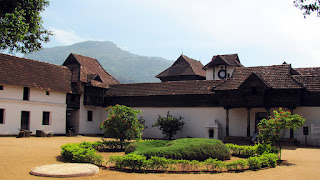 Taking a walk inside the deafeningly quiet- Padmanabhapuram Palace, we were struck by the remarkable edifices and structures left behind by the erstwhile rulers-the Travancore Maharajas. It also reminded us of the many Qur’anic verses, inviting our attention to ponder over the lessons of history: of the echos of the past and the fleeting nature of our own moments in this material universe. Standing on the courtyard of the Palace, one particularly remembered the soul- stirring observations of Imam Al- Ghazzali (ra) on the impermanence of this world:
Taking a walk inside the deafeningly quiet- Padmanabhapuram Palace, we were struck by the remarkable edifices and structures left behind by the erstwhile rulers-the Travancore Maharajas. It also reminded us of the many Qur’anic verses, inviting our attention to ponder over the lessons of history: of the echos of the past and the fleeting nature of our own moments in this material universe. Standing on the courtyard of the Palace, one particularly remembered the soul- stirring observations of Imam Al- Ghazzali (ra) on the impermanence of this world:
 There is little doubt that the lineages of the present indeed go
back in time even beyond what we know through available written records. Thanks to the geographical proximity with the Seas, the land has witnessed the advent of the foreigners over the centuries and evolved through time a rich history of complex interactions and is, hence, a cultural melting pot of different religious and linguistic communities.
There is little doubt that the lineages of the present indeed go
back in time even beyond what we know through available written records. Thanks to the geographical proximity with the Seas, the land has witnessed the advent of the foreigners over the centuries and evolved through time a rich history of complex interactions and is, hence, a cultural melting pot of different religious and linguistic communities. For long, the Maharajas (Kings) of Travancore had their headquarters and palace in the Kanya Kumari region. For close to two centuries (1600-1791), the entire region
constituting what is today called Southern Kerala and Southern Tamil Nadu were
administered from the same place. In the ebb and flow of time, the area witnessed many political battles and wars of domination between foreign invaders and native Rajas, including the famous Battle of Kulachal (1741) when a Deutch army, seeking domination in the area, was defeated by Maharaja Marthanda Varma. With the advent of a new age and another group of people-the mighty British Empire on the shores of India, the later Travancore Maharajas found a decline in their fortunes and were reduced to the position of vassals and subordinate allies of a mighty colonial administration till the eventual attainment of national independence in 1947 when a new era dawned on the Indian horizon.
For long, the Maharajas (Kings) of Travancore had their headquarters and palace in the Kanya Kumari region. For close to two centuries (1600-1791), the entire region
constituting what is today called Southern Kerala and Southern Tamil Nadu were
administered from the same place. In the ebb and flow of time, the area witnessed many political battles and wars of domination between foreign invaders and native Rajas, including the famous Battle of Kulachal (1741) when a Deutch army, seeking domination in the area, was defeated by Maharaja Marthanda Varma. With the advent of a new age and another group of people-the mighty British Empire on the shores of India, the later Travancore Maharajas found a decline in their fortunes and were reduced to the position of vassals and subordinate allies of a mighty colonial administration till the eventual attainment of national independence in 1947 when a new era dawned on the Indian horizon. Padmanabhapuram Palace
 In the 1950's, when India officially reorganized many of its provinces on the basis of linguistic majority, Kanya Kumari area was made a part of the Tamil-speaking State of Tamil Nadu. Until then, the area was the centre of the Malayalam-speaking, erstwhile Travancore State that has broadly become Southern Kerala today. Though Kerala 'lost' the territory holding the Palace of the Travancore Maharajas, thanks to the reorganization of the entire region; under administrative arrangements with the State of Tamil Nadu, the Padmanabhapuram Palace is still preserved by the Cultural Heritage department of the Kerala Government.
In the 1950's, when India officially reorganized many of its provinces on the basis of linguistic majority, Kanya Kumari area was made a part of the Tamil-speaking State of Tamil Nadu. Until then, the area was the centre of the Malayalam-speaking, erstwhile Travancore State that has broadly become Southern Kerala today. Though Kerala 'lost' the territory holding the Palace of the Travancore Maharajas, thanks to the reorganization of the entire region; under administrative arrangements with the State of Tamil Nadu, the Padmanabhapuram Palace is still preserved by the Cultural Heritage department of the Kerala Government.  Taking a walk inside the deafeningly quiet- Padmanabhapuram Palace, we were struck by the remarkable edifices and structures left behind by the erstwhile rulers-the Travancore Maharajas. It also reminded us of the many Qur’anic verses, inviting our attention to ponder over the lessons of history: of the echos of the past and the fleeting nature of our own moments in this material universe. Standing on the courtyard of the Palace, one particularly remembered the soul- stirring observations of Imam Al- Ghazzali (ra) on the impermanence of this world:
Taking a walk inside the deafeningly quiet- Padmanabhapuram Palace, we were struck by the remarkable edifices and structures left behind by the erstwhile rulers-the Travancore Maharajas. It also reminded us of the many Qur’anic verses, inviting our attention to ponder over the lessons of history: of the echos of the past and the fleeting nature of our own moments in this material universe. Standing on the courtyard of the Palace, one particularly remembered the soul- stirring observations of Imam Al- Ghazzali (ra) on the impermanence of this world:
“Praise be to God, who with death did break
the necks of tyrants, shattering with it the backs of Persia’s kings, cutting
short the aspirations of the Ceasars, whose hearts were long averse to recalling
death, until the true promise came to them and cast them into the pit. From the
loftiest of palaces to the deepest of graves, they passed, and from the light
of the cradle into the sepulcher’s gloom. From dallying with maidens and boys
into sustaining insects and worms, they passed; from revelling in food and
drink into wallowing in the earth; from the friendliness of company into the forlornness
of solitude; and from the soft couch into the woeful perdition. See if they had
found any strength and protection from death, or taken against it a barrier and
refuge. See ‘Do you perceive even one of them, or hear from
them a murmur?’ (19:99). [Abu Hamid al Ghazzali, The Remembrance of Death and the Afterlife: Book XL of the Revival of Religious Sciences, trans. TJ Winster, Cambridge: Islamic Texts Society, p.1, (1989).
Ancient Mosques
 By the Grace of Allah (swt), in our journey, we could also visit some of the ancient Mosques in the region, including the Malik Dinar Mosque in Kottar. The Mosque is named after a Sufi saint who came to India from Arabia centuries ago. Several of his disciples travelled far and wide in the region, and were instrumental in the establishment of several mosques in Kerala and Tamil Nadu, and a large number of people from different communities in this part of the world embraced Islam at their hands.
By the Grace of Allah (swt), in our journey, we could also visit some of the ancient Mosques in the region, including the Malik Dinar Mosque in Kottar. The Mosque is named after a Sufi saint who came to India from Arabia centuries ago. Several of his disciples travelled far and wide in the region, and were instrumental in the establishment of several mosques in Kerala and Tamil Nadu, and a large number of people from different communities in this part of the world embraced Islam at their hands.Spiritual Conversations
Our meetings with different people through the journey raised many opportunities to ruminate on very important questions of spirituality in everyday life. First, the staggering denominational differences, with the world of Islam splintered along so many sects and groupings in our times, certainly confuse people on how to think through these matters. Secondly, how does one deal with the challenges of going ‘solo’ against the grain of ‘majority-consensus’? Thirdly; there are deep issues of praxis, in every day family spiritual life: how to structure spouse relations on a common ground when both partners have diverging spiritual expectations and material interests? Fourthly, how to raise children in an Islamic way, and how to deal with the emotional problems of young adults who are affected by their loss?
The Mukarram
Amir Saheb spent considerable time in the journey, listening patiently to the
viewpoint and perspectives of people and responding to their questions. For
those of us who had the privilege of listening in, many of these conversations
were truly ‘Master Class’ on the art and craft of Da’wah. His empathy, understanding and affection took the
conversations to a level of genuine concern and engagement with the problems
that were raised before him.
At Kaliyikkavila, the
Amir Saheb counselled a family of husband and wife (who now belong to two
different denominational groups in Islam) of the importance of staying together
and supporting each other even when they have distinct outlooks on spiritual
matters. Like the Qur’an insists on Deen
matters, everyone is/should be free to choose or to remain with, his/her
spiritual convictions and there is/should be no compulsion or pressure from any
side to join either sect/group in any way. During this journey, the Amir Saheb
also reached out to the Ahmadi daughter of an old friend of his with the
purpose of promoting family reconciliation and peaceful coexistence on the basis of larger Islamic values- mutual trust, understanding, goodwill and compassion.
At Kulachal, the Amir Saheb counselled a Muslim family, on the importance of returning
to the spiritual values of our Faith. Finding that their only son is reeling
under an intense disappointment of an emotional problem, the family is at its
wits end on how to deal with it. Considering that every loss is also a
significant moment to think through and find oneself beyond the clouds, the
Amir Saheb in his wisdom suggested some practical measures on dealing with this
heartache.
 At Kottar, we met a Muslim gentleman who did not adhere
to any specific group and was willing to keep an open mind on learning
opportunities on best Islamic practices wherever available. The Amir Saheb’s
explanation quoting profusely from the Qur’an and the Ahadith, on the theological and eschatological dimensions of Islam, and its interpretational validity in our times, was once again a ‘Master Class’ in Da’wah.
At Kottar, we met a Muslim gentleman who did not adhere
to any specific group and was willing to keep an open mind on learning
opportunities on best Islamic practices wherever available. The Amir Saheb’s
explanation quoting profusely from the Qur’an and the Ahadith, on the theological and eschatological dimensions of Islam, and its interpretational validity in our times, was once again a ‘Master Class’ in Da’wah. 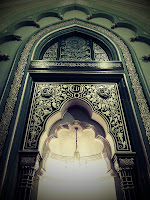 Everyone
who is worried about the plight of Islam today, the Amir Saheb reminded, should
remember the following traditions from the Holy Prophet (sa):
Everyone
who is worried about the plight of Islam today, the Amir Saheb reminded, should
remember the following traditions from the Holy Prophet (sa): “The same fate will overtake my followers as it did the Israelites….The Israelites were divided into seventy-two sects, but my followers will be divided into seventy-three sects. All of them will go to hell except one sect”.
They enquired, O Messenger of Allah, which is that (sect)?"
He said: Those who follow in my footsteps and in the footsteps of my companions".
In another tradition, the Holy Prophet (sa) is reported to have prophecized:
"Verily the Almighty and Glorious Allah (swt) will raise for this people at the turn of every century one who will renew religion (Islam) for them".
In another tradition, the Holy Prophet (sa) says, "A party of my community shall continue striving in the cause of truth- they shall be triumphant over their opponents".
On Divine Signs in Our Times
In
another article on the Blog, we have reported on the recent Cyclonic disaster
in the Kanya Kumari region. At the Kovalam Mosque, we came across a Muslim
gentleman who described to us the Sign of Cyclone Okhli which he himself witnessed
while remaining at the Mosque. The horror and fear of those moments came alive
in his description of the natural phenomenon and he had no iota of doubt in his
mind that it was indeed a Sign of the Divine. For an account of the devastating Cyclone Ockhi,
see the Blog article here.
Alhamdulillah, the Da’wah programme was, all in all, an
exciting spiritual journey to that ‘junction of two seas’. One abiding memory from
the trip will be the Sun-rise moment. In Kanya Kumari, along with hundreds of
tourists who were there at that early morning moment, we could bear witness to that
magnificent natural phenomena: with the Sun rising over the Indian Ocean, the
white thread of light ends up the tyranny of the night and illumines the whole
horizon, Soumma Alhamdulillah.






